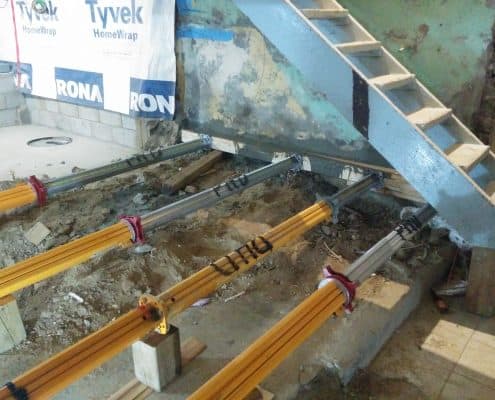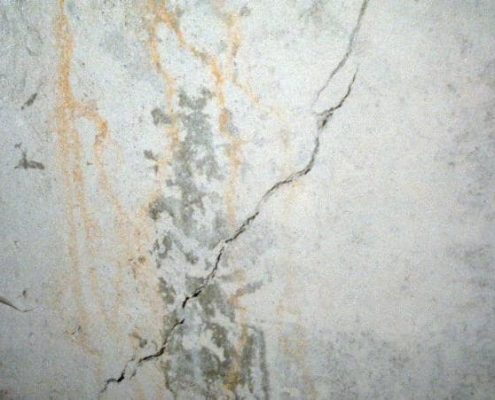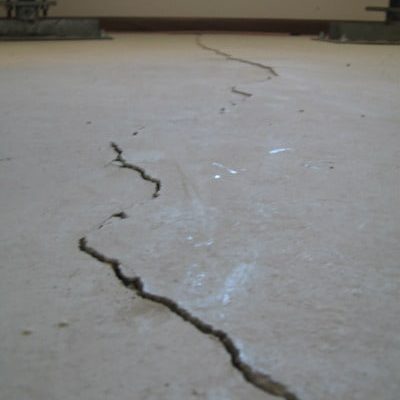Nusite Group has over 30 years experience in structural foundation repairs in Toronto and can handle foundation problems of any size and complexity.
Nusite Group can repair small foundation cracks, all the way up to major structural repairs and crumbling foundations. Fixing foundation problems is serious business so be sure to be thorough and extensive when searching for a foundation contractor as inexperience and poor work can cause not only major damage to your home, but can present serious safety issues.
We employ the latest in foundation repair methods and technology to ensure your foundation is rock solid and impervious to the damaging effects of water seeping into your foundation. Different foundations require different foundation repair solutions. Contact Nusite today for a free inspection and on-site estimate.
Foundation and Structural Problems We Repair:
- Crumbling/Ageing Foundations
- Sinking Foundations
- Aging and Cracked Foundations
- Bowed Walls
- Holes and Cracks in Foundations
- Major Structural Repairs
- Concrete Slabs
- Basement Slabs
- Suspended Slabs
- Structural Openings
- Cement Sidewalks
- Retaining Walls
- Delaminating Concrete
CONTACT US TODAY FOR A FREE ESTIMATE
Any foundation can experience these problems. Generally they can be remedied with the help of a properly insured professional foundation contractor. These are major issues, if left unfixed may lead to larger problems like structural compromise, collapse and an unsafe living environment. Symptoms would be cracks on exterior finishes and on interior plaster or drywall, noticeable dips in the floor, crumbling of the foundation and bowing exterior walls. Foundation damage can be signs of serious and potentially dangerous conditions and having professional foundation contractor conduct an inspection is the only way to accurately determine the source of the problem.
Over time, it is common for smaller problems to develop in the foundation of your home. Cracks or rod holes will lead to leaks and ultimately cause a wet and moldy basement. It is best to repair any cracks as quickly as possible so they don’t expand, creating a bigger and more expensive problem.
When determining if there is a crack or hole in your foundation, it is important to know what to look for. Some of the tell-tales signs of a foundation crack include: wet carpets, water stains on the walls or ceiling, and wet baseboards. Most of the time the actual leak is not even located in the same area where you’ll see your water damage. Hiring a professional foundation repair contractor with the right tools is the only way to accurately determine the source of the problem.
What are The Signs of a Foundation Crack
The signs of a foundation crack:
- Wet Carpet
- Water Stains on the Wall or Ceiling
- Wet Baseboards
- A Physical Foundation Crack
- Efflorescence
- White Powder Along the Bottom of Your Basement Wall
Remember, the majority of the time a water leak is not entering your basement in the same area as the damages you are seeing. Hiring a professional foundation repair contractor or waterproofing contractor, like Nusite, is the only way to accurately determine the source of your basement leak.
Not all foundation cracks are the same
Depending on the size, direction, and severity of your foundation crack, it can be normal settling of your foundation or signs of serious damage to your foundation.
If you see any horizontal or diagonal cracks in your foundation, or you have any crack that is getting larger or allowing water to enter your basement, call a foundation contractor to have it inspected. Nusite Group is a foundation repair company in Toronto, we have been serving the GTA for over 30 years and provide free, in-home estimates and inspections.
Foundation Repair FAQ
Is Repairing a Foundation Worth It?
Repairing your home’s foundation can be quite costly, but we can assure you that every penny is worth it. Remember, your foundation is the base of your house. If the structural integrity is compromised with major cracks or damage, so is the rest of the house. As such, leaving it untreated can be very dangerous.
Imagine a home’s foundation is like a spine. The spine keeps you standing straight, just like your home’s foundation. As your spine begins to wear down, you feel it, and the longer you wait to treat it, the worse your pain gets. And if your spine cracks or breaks, well, the results can be devastating.
Can a House Collapse from Foundation Issues?
It’s very unlikely that a house will collapse completely from foundation issues but it can affect the structural integrity of parts of your house.
Problems with your foundation can lead to the following:
-
Cracked or warped walls
-
Uneven floors
-
Doors that won’t close properly
-
Jammed or loose windows
-
Mould and/or water damage
However, severe structural damage can also lead to broken pipes and electrical issues, and in extreme cases, portions of the house could collapse. But don’t fret — it generally takes years before foundation issues become serious and there will be plenty of warning signs ahead of it.
What Are the Warning Signs of Foundation Problems?
Your house will settle over time. This is a known fact. It’s a big and heavy structure; eventually, it will begin to very slowly sink a little into the ground. However, there are factors that can affect the speed at which it settles or whether it settles evenly, such as:
-
The soil was improperly compacted when the house was built.
-
The soil under the house is comprised of different compositions, some that may move easier than others.
-
The soil under the foundation has begun to erode.
-
The soil under the foundation has improper drainage.
Just like with a damaged spine, foundation problems can cause secondary issues throughout your home. The earlier you spot these secondary issues, the quicker you can have your foundation assessed and repaired before more serious issues start.
Warning signs you may have foundation issues include the following:
Damage to Walls
Walls can lose their support when the house settles, thus the formation of small, vertical hairline cracks in the foundation or brick walls is pretty common. However, large or horizontal cracks are not. Excessive house settling can lead to cracks, fissures, warps, decay, mould or water stains in your interior and exterior walls. If you spot any of these signs on your exterior walls, it is a good indication that something is happening with the foundation.
Furthermore, if you spot crumbling bricks or cement walls, call to have your foundation assessed right away. For brick exteriors, cracks are typically found near the corners and run vertically. Also, any bricks that stick out from the wall could also be an indicator.
Interior Separation
While a touch of unevenness is expected as a home ages and settles, more than that could indicate a foundation issue. Some separation signs to watch for include the following:
-
Cracks where the walls and ceiling meet
-
Damp crawl spaces
-
Cracks in tile flooring
-
Floors that appear to be sagging or are uneven
-
Doors that no longer close properly
-
Wallpaper that is pulling away from the wall
Damage to the Foundation Itself
The foundation of your home is built to withstand the weight of your house for many years. As such, you should not see any signs of damage to it. Therefore, if you do spot any kind of damage to the foundation itself, whether it be a crack, fissure, chipped or flaking concrete, water stains, mould, or other, chances are good that there’s an underlying issue somewhere. Signs on the foundation itself may be more difficult to notice for homeowners with finished basements.
It’s a good idea to regularly check your home for any of the above-mentioned signs. If you do spot any of these indicators, know it’s time to have your foundation assessed.
How to Tell if the Foundation Crack is Structural?
There are two ways to tell if a foundation crack is structural. First, if the width of the crack is at least a quarter of an inch or wider. Second, if the crack is running along the foundation wall horizontally. Structural cracks are dangerous as they can affect the structural integrity of the home.
There are several types of foundation cracks you may encounter in your home over the years, with some more concerning than others. Here are three types and what they mean:
Horizontal Cracks
Unbalanced soil and water pressure are the most common causes of horizontal cracks in the foundation. When left untreated, a horizontal foundation crack will continue to expand and can eventually lead to complete foundation failure. Fortunately, they can be permanently repaired. If you spot a horizontal crack, reach out to an expert right away.
Stair-Step Cracks
These foundation cracks are among the most common because block foundations are prone to them. They are generally caused by bowing walls and are a clear sign of foundation issues. You will likely spot stair-step cracks on the interior basement foundation walls, whereas, for brick foundation homes, you may see it exteriorly.
Vertical or Diagonal Cracks
Vertical or diagonal cracks run up and down the falls and are generally the least concerning foundation cracks. They are also easy to repair to prevent bugs and water from getting in by waterproofing services. They are most often spotted in the middle of a wall and are caused by either settling or the concrete’s natural curing process. However, if there is more than one, if it continues to spread, or if the crack is wider than one-quarter of an inch, it could mean structural issues and should be assessed.
What Are Common Techniques to Fix Foundation Problems?
There are many different methods for repairing foundation problems, including the following:
Mud Jacking
This method is also referred to as concrete lifting. Small holes are drilled into the foundation floor and then a mixture of cement slurry is pumped under the foundation to lift the house to a more even position.
Piering
This method places either steel, helical, segmented, or concrete piers deep underground to stabilize and reinforce your home for many years.
High-Density Polyurethane Foam
This method is great for repairing emergency foundation issues. It’s easily accessible and quick-rising, which makes it ideal for repairing concrete or something that’s time-sensitive.
Concrete Patches
This method is used for cheap, temporary repairs or fixing foundation issues that are surface-level. However, if there are more serious foundation problems, this method will only delay the inevitable.
Testimonials
Jeffrey Leal of Nusite Waterproofing found my problem within minutes of examination my basement; a broken drain pipe leading from my kitchen above. No foundation problem. No charge.
A previous Company was talking about the possibility of ground water coming up through my concrete floor; major costs discussed.
hank you Jeffrey.
So happy that I chose Nusite Group! Before starting this project I was very nervous about lowering my basement. Jeff was the first person to contact me. He came out and gave me the initial quote. He was so nice and very comforting and really helped me understand exactly what was involved.
Martin and his crew then completed the work. They worked very hard and dug very quickly. For a generally very messy job I was very impressed with how clean they kept my property.
I’m very excited to use my new basement!
I had recently purchased an older home in Toronto. The basement had a running leak from the cold room into the basement. After receiving quotes from many other Waterproofing companies, I found David and Ryan to be honest, fair and trustworthy for the job. Everything explained very clearly, work done on time and the crew cleaned up the area very well on their way out. Happy to refer to Nu-Site.
Thank you,
My parents were away on vacation and I watching their house and noticed a leak. Called NuSite and they came all the way to Hamilton to fix the leak. A+ customer service and A+ work. I dealt with David who came out promptly and kept my costs within the estimate he provided.
Happpy customer!











